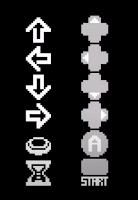Fifty Days of UFO 50: Day 43
I'm having a bit of a bad time here with the sixth title in UFO 50's constructed chronology, Mortol. It's not just a lack of run optimization to build up a reserve of extra lives, though. The whole theme of sacrificing people to advance is reminding me of the real world problems affecting my chosen profession.
This isn't some scathing criticism of the game's core design gimmick or anything; it's an interesting enough twist on the challenges and demands of a puzzle-platformer, (even if the sequel, Mortol II feels more pointed.) No, the rotten mood I'm in is mostly to blame. Two more studios had layoffs today; Happy Halloween! And I hear tell of yet more positions being cut at websites and publications that ostensibly cover games. The idea was to use this project to get back into some sort of structured habit and then return to the job hunt, but it's hard not to feel apprehensive.
Even if I manage to make it back into the industry, will I be thrown at tasks I'm not equipped to solve like a human lawn dart?
Maybe my contribution will burn bright like a creative explosion before the project implodes and the layoffs begin anew?
Perhaps if I survive that subsequent round of layoffs, I can become more like a foundational brick upon which future profits can be built...
It isn't really the game's fault that its systems are suggesting colorful metaphors for the awful job market in which I find myself. That reading doesn't gel with the creative intent behind UFO 50 in the slightest. In a recent gamesindustry.biz interview, the same desperation I'm feeling is practically baked into the headline,
"Derek Yu's vision for a human-driven games industry in the story of UFO 50's development"
...even the subhead, "Mossmouth's lead developer on what the eight-year-long project has to tell us about where indies can go" communicates what the editorial was hoping to get out of this interview; where the hell do we go from here?
It's a well-written article that contains a lot of interesting information about how UFO 50 was structured as an unusual project. Derek has plenty to say about:
- Making the kind of games you want to play
- Giving projects the time they need to become the best version of themselves
- Collaborating with creatives you trust and letting them all influence outcomes
- Remaining small and flexible enough to not get bogged down and waste much work
- Finding value in old patterns that get overlooked as we chase modern design trends
- The importance of playtesting outside of the team
"I think continuity can be valuable, for sure, but it shouldn't be forced – developers should work together because they want to."





Comments
Post a Comment